Growth of the casino industry worldwide is pushing demand for security equipment. A&S examines the reasons for the growth as well as the major markets and players.
Growth of the casino industry worldwide is pushing demand for security equipment. A&S examines the reasons for the growth as well as the major markets and players.

Two main factors are driving growth in the casino industry, both with an economical substrate, said Alberto Bruschi, Sales Director, CIEFFE. Firstly, global economic growth is fuelling increased expendable income; which is, in turn, being poured into the entertainment sectors. The second factor is tourism: many countries are attempting to increase tourism industry revenue by building casinos, which are considered a very good source of income.
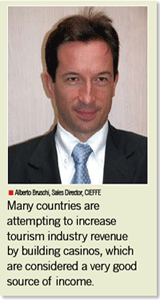
In the past three years, a boom in Macau has seen the opening of at least five new large casino properties, with more to come, and others planned for Singapore, said Tracy Tye, Casino Account Manager for IndigoVision. In addition, Australia and New Zealand have 16 casinos about the same size as a mid-sized Las Vegas casino; while South Africa has the famous Sun City, site of the Nedbank Golf Challenge ("The Million Dollar Challenge"), and other African nations have smaller properties.
South America (Brazil, Argentina, and Chile) is also growing its casino count. Then, in Europe, there are quite a few club-style casinos, with the U.K. moving to allow resort-style super casinos. According to Douglas Florence, Director of NiceVision's Gaming Sector, Nice Systems, Moscow alone is expected to boast 53 casinos, and the Cotai Strip in Macau will add six mega resortsthe Hilton, Marriott International, Starwood, Regal, Dorsett and InterContinental Group.
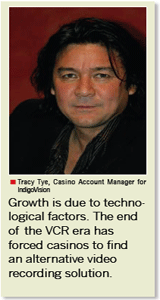
Worldwide, card rooms and commercial casinos (including U.S. Indian casinos) took in nearly US$55.6 billion in 2005, said Florence; growth in other markets is expected to surpass even the 11-percent 2006 growth in the U.S., through 2008.
Growth is fairly steady looking at the worldwide sector, said Chris Williams, Marketing Director for Wavelet Technology. Individual countries tend to expand or contract in fits and starts, depending on local legislation. For example, South Africa experienced a large boom a few years ago when the country licensed casinos for the first time, but growth is now slow as all available licenses have been taken. Turkey expanded vigorously some years ago, with over 300 casinos opening in just a few years. Following this, however, the Turkish government banned casinos and they all closed down.
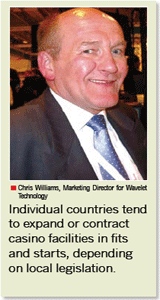
The market potential for recording alone, said Scott Bartlett, CEO of Southwest Surveillance Systems (SSS), is between $2 billion and $4 billion. "With less than 20 percent of the market currently using digital recording, this presents a tremendous opportunity, globally."
Technology Driving Growth
The largest driving factor for security is technology, said Nevada Gaming Control Board (Nevada GCB) officials. Advances involve digital video recording and interactive review software; as the video industry is moving from analog to digital.
Growth can really be attributed only to techno-logical factors, confirmed Tye. "The end of the VCR era has forced casinos to find an alternative video recording solution. Many casinos, which have taken a long time to decide on technology, suffer from the fact that their systems are now obsolete." That said, less than 1 percent of casinos have moved to fully digital systems. The 30 percent of casinos that have discarded VCRs have opted for hybrid analog and digital systems using DVRs, while maintaining analog video-switching matrices.
Disadvantages Of Current IP Technology
One impediment, said Michael Usami, Senior Manager of the Product Planning Section at Sony's IPELA Department, is that, even though casinos want to transition from VCRs to DVRs, IP cameras are not always chosen because use of IP currently comes with delays in pan-tilt-zoom (PTZ) control; and frame rate cannot be guaranteed.
Demand for pure, end-to-end IP solutions in the gaming industry is very low, confirmed Florence, because of slower response times for PTZ cameras and fault tolerance. If the network fails, the video surveillance system is unable to continue recording; and many state gaming commissions mandate that casinos must shut down or face large fines.
Network redundancy is possible, he added, but it is expensive. Since casinos are price-sensitive, he expects that the industry will adopt pure IP video solutions later than others. The gaming commission in Missouri, however, is spurring the reluctant players to move: It recently mandated that all casinos in the state move to digital recording.
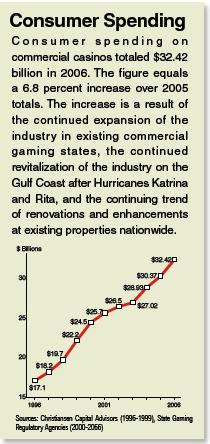 Lucrative U.S. Market
Lucrative U.S. Market
The U.S. commercial casino industry is one of the most lucrative in the world. According to Florence, it includes 787 land-based commercial casinos, 84 riverboat casinos, 411 tribal-run casinos, and 25 racetrack casinos (racinos). Total gambling services (including all non-casino betting activities and services) in the E.U. generated $67.10 billion in revenue in 2006, according to a study by the University of Nevada, Reno, compared with $32.42 billion in gross gambling revenue in the U.S. commercial casino industry alone in the same year.
The industry is a mature one still enjoying "incredible growth potential," said Frank Fahrenkopf, Jr., President and CEO of the American Gaming Association (AGA).
A pol l car r ied out by Har rah's Entertainmentthe largest gaming company in the worldrevealed that, in 2006, 26 percent of the U.S. adult population visited a casino.
Since the 1980s, Las Vegas casinos on the Strip have attracted billions in investment. The trend is set to continue into the next decade, as MGM Mirage's $7-billion project and Boyd Group's $5-billion complex get under way. Although there are only 11 states with commercial casinos in the U.S., the industry has more than doubled in the past 12 years, according to figures released by the AGA.
Nevada alone accounted for over $10 billion in gross gaming revenues in 2005the western U.S. region is responsible for 33 percent of the country's casino visitorswhile the Indian casino industry has been estimated to be worth $18 billion a year.
Even areas devastated by Hurricanes Katrina and Rita were not exempt from growth; the 2007 AGA Survey of Casino Entertainment showed that 95 percent of interviewees believe that the U.S. Gulf Coast industry will grow more quickly than the rest of the regional economy in the next five to 10 years.
Uniqueness of U.S. Market 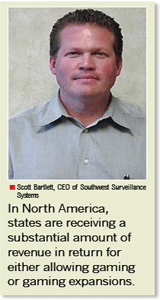
"In my opinion, the driving factors have not been political, social or technological but only economic," stated Bartlett. "For example, California has just approved expansion of four casinos (17,000 slot machines), in return for each giving the state government $100 million in revenue each year. Deals like this are spreading across North America, where each state is receiving a substantial amount of revenue in return for either allowing gaming or gaming expansions."
U.S. racino operations are the next coast-to-coast emerging gaming market, said Florence, due to revenue-generating capability and need of states to meet budgets. Some 6 percent of the Delaware state budget comes from three racinos.
Fredrik Nilsson, General Manager, Axis Communications, however, damped down some of the enthusiasm that these numbers might cause among security vendors. "While we all notice the hundreds, if not thousands, of cameras in casinos, this vertical market is actually not one of the top five in the surveillance industry."
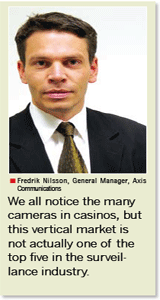
Bartlett's company has estimated that, in North America, there are approximately 1,600 casinosthose with under 300 slots were not included. Casinos, on average, possess a 500-unit camera system. "From a dollar perspective, a casino this size that is converting to digital video recording would represent approximately a $1-million investment." The cost of a surveillance recording system, he added, is in the servers and hard-disk drives; everything else pales in comparison. Less than 5 percent is access control, alarms and biometrics. There are approximately 800,000 channels of recording in North America, he concluded.
Casinos account for less than 10 percent of the overall electronic security market, said Tye in agreement with Nilsson. The market, however, generates strong demand for niche products and systems. The large video systems that casinos require thus make them attractive customers for electronic security vendors. The U.S. accounts for 70 percent of the world's casinos, continued Tye, adding that while Las Vegas has the most large resort-style properties, in the last decade, tribal casinos in the U.S. and Canada have come to outnumber Las Vegas casinos; but these are generally smaller properties.
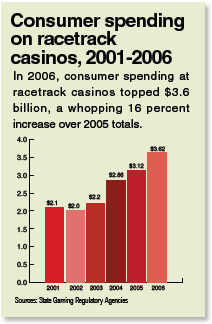 U.K. Loosens up on Gaming Regulations
U.K. Loosens up on Gaming Regulations
The U.K. commercial casino industry, until now one of the most strictly regulated gaming environments in Europe, has been at the center of intense public debate. Since the 2005 Gambling Act, concerns have been raised amid claims that gambling addiction is likely to become one of the country's most serious problems by 2026.
The Act has removed several barriers, allowing three new types of casinos to operate in Britain. One regional casino or super casino will be permitted, along with eight large and eight small casinos. Although officially, 17 casinos will be permitted, all 140 existing British casinos, most of which were too small to qualify for a small casino operating license, were permitted to continue to operate until September 2007, when the new Act came into force.
A 2006 Swiss Institute of Comparative Law (SICL) study noted that, in addition to the fact that U.K. casinos were positioning themselves to take advantage of what they anticipated to be a deregulated market prior to the legislation, there was keen interest in the U.K. gaming market, especially from the U.S. and Australia. Among many planned large projects is Center Parcs' commissioning of PricewaterhouseCoopers to investigate the feasibility of launching casinos at its four U.K. holiday resorts. Analysts Ernst and Young forecast that, by 2014, casino developments in the U.K. may be worth as much as $10 billion.
Casino revenue in the U.K. stood at $1.42 billion in 2006, said the European Casino Association. In addition, a U.K. casino report by Mintel described the industry as standing at a crossroads; it further predicted that the Act will serve as a major catalyst for growth. The supply of new casinos is set to grow significantly and relaxation of advertising restrictions will open up vital channels. This followed reports in late 2005 that, within five weeks since implementation of the new Act, Britain's 140 casinos received three times more visits.
It is also estimated that at least 3 million visitors a year will game at the new Manchester super casino, the building of which was approved earlier this year. For many years, the industry had operated in what Mintel calls "a regulatory straitjacket," which constrained growth. Consumer demand has remained static as it was restricted to a small percentage of serious gamblers. Casinos, however, are now entering the mainstream leisure industry.
Who's Involved
Ben Donohue, Vice President of Business Development for Axcess International, named Pelco and Sony as the main CCTV suppliers; Nice, Integral, Panasonic and Pelcom as the main DVR vendors; Axcess International as the leader in casino security RFID products; and Lenel, GE, Honeywell, Software House, Kantech and Casi as the most prominent access control players.
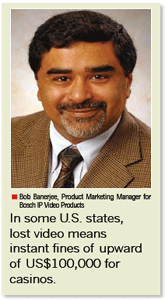
The key manufacturers that provide a full line of integrated solutions for casinos, including cameras, analog matrix switchers and recording technology, are Bosch, Honeywell and Pelco, stated Bob Banerjee, Product Marketing Manager for Bosch IP Video Products. Meanwhile, the Nevada GCB considers the major players in Nevada's current surveillance electronic market to be Cisco-Sypixx, Honeywell, Pelco, DVTel, Philips-Bosch, Hi-Q, Intellex and Sanyo. Usami confirmed that Pelco and Honeywell are the main players, adding that Panasonic cameras and Sanyo recorders are also highly in demand. Finally, Bruschi numbered Nice, Pelco and Dallmeier among the most important vendors.
Key players come and go, said Tye. "As technologies change, key players get left behind because they are focused on maintaining what was yesterday's preferred system."
Pelco and Honeywell were the two key players for large casino installations in the early part of the decade. IndigoVision and Cisco are emerging competitors as IP video gains momentum and finds favor with casino surveillance teams.
"One point to note is that the size of casino surveillance systems means that they are not completely upgraded very often; they are usually migrated gradually to newer technology by the existing systems vendor. This makes it difficult for new vendors to break in."
As for security integrators, several firms based in Nevada and New Mexico dominate the U.S. market, said David Harrell, spokesperson for New Orleans integrator Interstate Electronic Systems. "They have more or less specialized in the casino market and are not typically a factor in other markets."
In North America, there are only a few players that provide integration, said Bartlett. In estimated size order, these are SSS, North American Video (NAV), Global Security Associates (GSA), International Electronic Protection (IEP), and a handful of second-tier players. The most commonly-used products in the casino industry come from Pelco, Honeywell, Synectics, IndigoVision, DVTel and IBM/Datacom.
"Each of these manufacturers provides a unique solution for the gaming environment. Support, however, is the biggest issue. Given that systems integrators install systems in casinos all over the U.S., reliability and service from the manufacturer dictate which product is chosen."
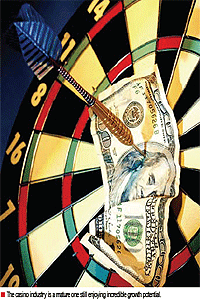 Government Restrictions in different countries
Government Restrictions in different countries
National, state and local governments have different laws regarding use of electronic security, said Tye. For example, some U.S. states require that video be retained only seven days; others 30 days. Most Canadian casinos have access control systems, whereas casinos in Las Vegas do not. U.K. and European casinos tend to be along the lines of U.S. casinos when it comes to security.
Furthermore, some countries have gaming regulators that are quite involved in casino operations and policing, while others have an industry which includes little or no involvement from outside entities.
The Chinese government, for example, takes a large cut of casino revenues, so it wants to protect its interests; it has thus imposed strict surveillance and security regimes.
The U.K. has a lesser degree of regulation because the government has no direct stake, and privacy issues are a factor. Some South American jurisdictions operate with no regulation at all.
There are also differing laws on data protection and whether the public can access recordings, explained Cedric Vansteenkiste, Head of Business Development, Telindus Surveillance Solutions. Some countries require watermarking or equivalent technologies to prove the authenticity of a recording for evidential purposes; while others demand that authentication does not change video in any way, such as by using MD5 hashing or similar techniques.
Bartlett pointed out that some nations require longer storage periods for footage, high-resolution cameras, and mantraps and door interlocks, as well as high reliability for equipment (no down time).
First-tier manufacturers meet and usually exceed casino requirements. That said, camera requirements are much the same worldwide, opined Tye, as all casinos need real-time video recording on table games. Because casinos worldwide generally meet only minimum standards (cost is a factor), this determines how much video storage is required and whether it has redundancy (backup).
Usami observed that Las Vegas casinos are required to have 25 frames per second or more for recording and monitoring. In some states, lost video means instant fines of upward of $100,000 added Banerjee. According to Simon Harris, Senior Industry Analyst at IMS Research, the Belgian government also requires video to be recorded at 25 frames per second, with a minimum of one-month storage.
Security matters are also complicated by the fact that the industry is one of the most regulated and heavily taxed in the world. In addition, in the U.S., casinos have to comply with gaming and alcohol regulations, state and federal laws, and individual gaming company policies. The nation's Native American gambling enterprises also have tribal regulations.
State-Run Versus Private Facilities
"Typically, we see a much higher level of electronic security in state-owned facilities," observed Bartlett. "In the private sector, money is always of great concern, while in the government sector this is less of an issue. Some government facilities require that video be recorded for one to three years.
This requires a tremendous amount of storage and expense. We also tend to see a much higher level of access control, biometrics, and integration in state-owned casinos. While access control, alarms, and biometrics account for 5 percent of the overall systems integrator's job in the private sector, in the government sector, they usually amount to 15 percent to 20 percent."
Private facilities are restricted in some ways by budgets. Casinos prefer to spend money on revenue-generating departments, said Tye. State-owned and operated casinos generally have a high level of access control and a number of auditing systems, he concluded, because they have a greater level of accountability. In addition, association with the government means more bureaucracy.